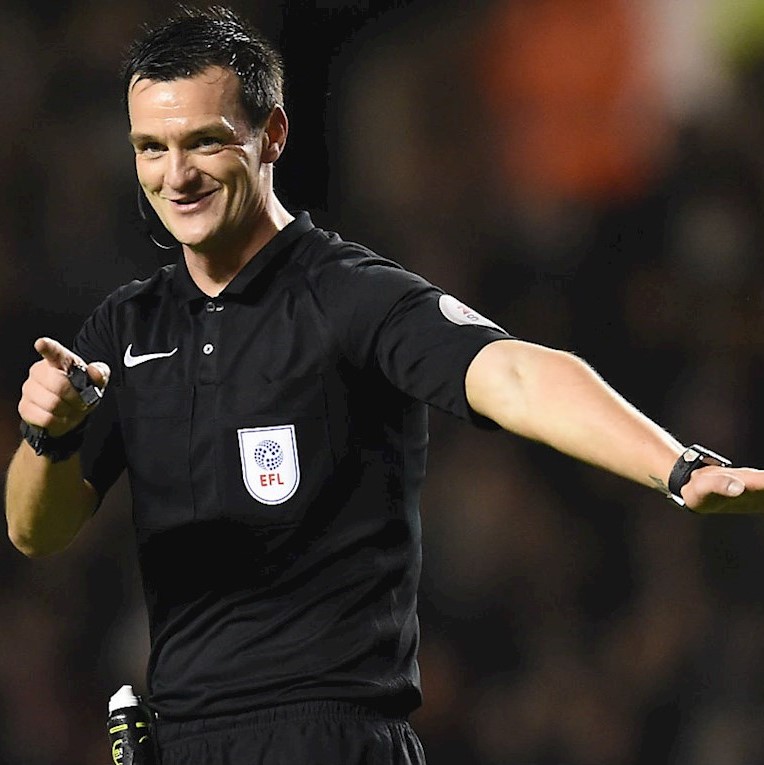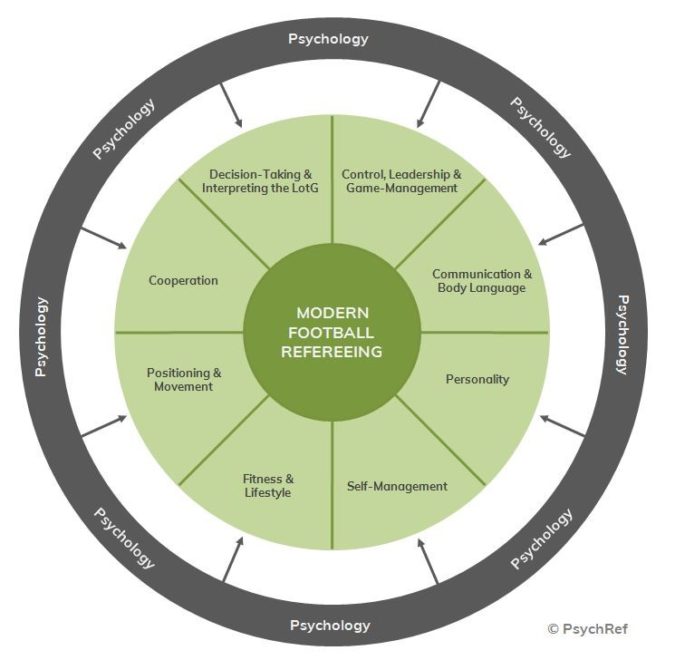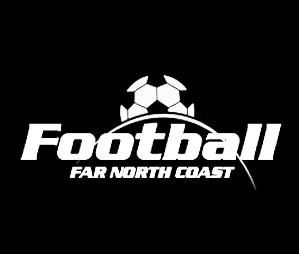Presentation, Communication and Body Language
I have included a diagram in this blog that shows the psychology of refereeing modern football. In it you will see there are several areas that match officials need to work on. Eventually we will try and cover them all, but today we will work on Presentation (Self-Management), Communication and Body Language.
Presentation (Self-Management) is the easiest, as it is totally in our control how we present ourselves before, during and after our games as a match official. I know when I was a player, if I saw a referee turn up in his dress gear (polo shirt and dress pants) it instantly made me feel he cared about what he looked like and was likely therefore to also take care to know his role properly. Now I know that is not necessarily the case, but the old saying that you can’t make a first impression twice is true! No-one is asking our Match Officials (MOs) to spend $100s on dress shoes and trousers. Big W, K-Mart and Vinnies have black trousers and shoes at reasonable cost (especially Vinnies and the like)!!! A big part of the self-management is ensuring you turn up on time as well. The latest we need to be at the ground is 30 minutes before kick-off, but even this is cutting it fine. A minimum of 45 minutes prior to the scheduled kick-off is ideal.
Presentation is just as important during the game. Again, match officials that take the time to make sure they have clean gear (especially the boots) always look like they care just that little bit more than someone that doesn’t do this. We can’t all afford two pairs of boots (playing and reffing) but it doesn’t take much to clean them before your game whenever possible. Shirts tucked in and socks pulled up is an obvious requirement. Now I know this sounds all a bit school teacher-ish (not that there is anything wrong with school teachers), but it’s the way we as match officials need to present ourselves. As you progress you should also look to buy different coloured shirts to avoid clashes with team kits. If cost is a problem, speak to Luke about how FFNC can assist.
Now, Communication and Body Language are a bit harder to both learn and teach. A lot of it comes with time, but the key thing to remember is RESPECT. We want respect from players and coaches, so we must show respect, even in the face of someone not showing us any. No matter what is said to us, it is super important to maintain our cool and deal with all players and team officials calmly and respectfully. Keeping your hand extended at the waist and palms out is always a good way to both create space and project a calm manner. Speak clearly and calmly and do not debate decisions. A smile and comment like, “well that’s not how I saw it, lets play the game now and we will discuss it later” whilst moving away from the area and signally play-on will defuse most situations. Remember that no matter what, it is what YOU saw that counts, not what the players/team officials think they saw!!!
As referees we make hundreds of decisions every game – even not blowing the whistle is a decision. We just need to learn to trust our instincts and roll with them. If you make a mistake, learn from it and move on quickly.
Remember that match officials communicate non- verbally too. We use the whistle, our arms and our body language in general. Importantly, when we decide there was a foul and we need the whistle, it is imperative that the whistle is blown loud enough so everyone can hear it. Short and sharp for a small infringement, looong and LOUD for a big foul. I say to all the young up and coming referees that it is always good to find a foul early in the game to get you into it and get the players used to your presence. Just as players like to get that first touch, referees should be looking to identify that first foul to set the tone of the match.
Our body language needs to be positive and confident and our communication style should be the same. Confident, positive and smiling. After all we are there to enjoy it as well!! A laugh with a player/s is always good. As long as we are careful to not laugh at players but only with them. I believe if you are enjoying the game and people see you doing so, you will make better decisions and be a better referee.
We need to manage our players. If a player/team official gets out of line then deal with them firmly, respectfully and confidently. If they won’t listen, involve their captain. Say to the captain, “Johnny/Jane (if you know their name) or #13 is getting out of line and if he/she doesn’t improve their behaviour then I will need to deal with them. Can you have a word with your player please”. If that doesn’t work, then take appropriate action against Johnny/Jane and the other players will see it’s not your fault that they got sent off.
As I said in my preamble, Communication and Body Language is the hardest to teach. We as match officials need to work on it constantly and learn from what does and doesn’t work, in different scenarios. Watch other more experienced MO’s live or on TV and see what they do and what works for them. Incorporate that into your routine and see if it works for you. Remember always that we must be confident, respectful and never arrogant. Remember the last blog “smile and wave” mentality when you know you are right.
However, Presentation (Self-Management) is the easy one. Remember that how we look can define for others how we are going referee – before we even start the game! Look good, feel good is a truism.
Finally, you can check out the qualities of the “Ultimate Referee” by clicking here. It relates to the themes I talk about above and shows the personality traits that the very best referees display to effectively manage a game.
As always, have fun out there when we get back on the park. Try and make use of the time away from the game to study those laws of the game and/or complete some of our quizzes!!
See you soon, I hope.








